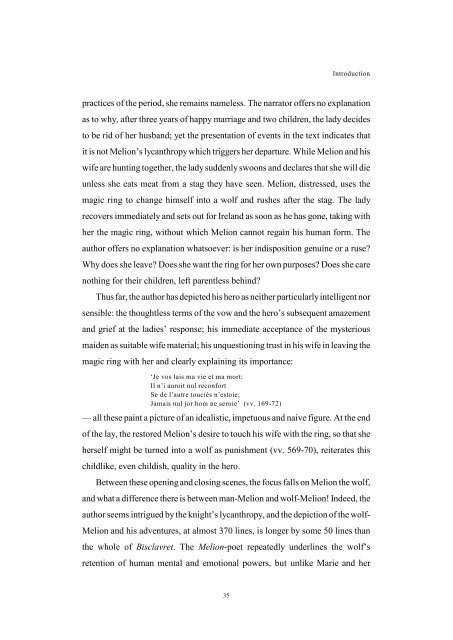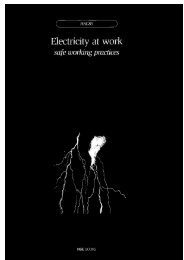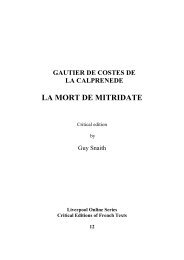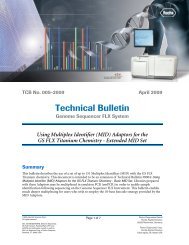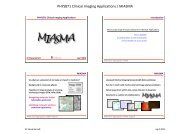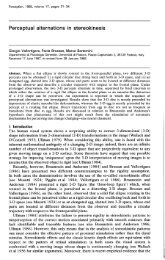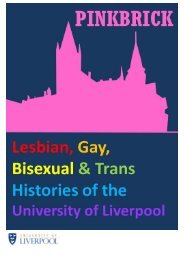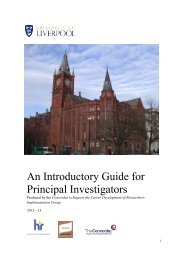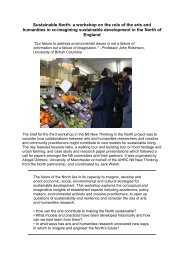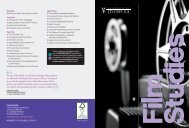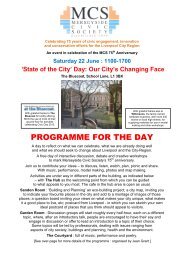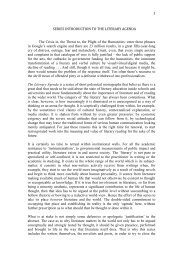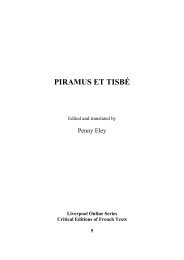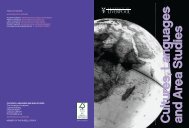Melion and Biclarel - University of Liverpool
Melion and Biclarel - University of Liverpool
Melion and Biclarel - University of Liverpool
Create successful ePaper yourself
Turn your PDF publications into a flip-book with our unique Google optimized e-Paper software.
Introduction<br />
practices <strong>of</strong> the period, she remains nameless. The narrator <strong>of</strong>fers no explanation<br />
as to why, after three years <strong>of</strong> happy marriage <strong>and</strong> two children, the lady decides<br />
to be rid <strong>of</strong> her husb<strong>and</strong>; yet the presentation <strong>of</strong> events in the text indicates that<br />
it is not <strong>Melion</strong>’s lycanthropy which triggers her departure. While <strong>Melion</strong> <strong>and</strong> his<br />
wife are hunting together, the lady suddenly swoons <strong>and</strong> declares that she will die<br />
unless she eats meat from a stag they have seen. <strong>Melion</strong>, distressed, uses the<br />
magic ring to change himself into a wolf <strong>and</strong> rushes after the stag. The lady<br />
recovers immediately <strong>and</strong> sets out for Irel<strong>and</strong> as soon as he has gone, taking with<br />
her the magic ring, without which <strong>Melion</strong> cannot regain his human form. The<br />
author <strong>of</strong>fers no explanation whatsoever: is her indisposition genuine or a ruse?<br />
Why does she leave? Does she want the ring for her own purposes? Does she care<br />
nothing for their children, left parentless behind?<br />
Thus far, the author has depicted his hero as neither particularly intelligent nor<br />
sensible: the thoughtless terms <strong>of</strong> the vow <strong>and</strong> the hero’s subsequent amazement<br />
<strong>and</strong> grief at the ladies’ response; his immediate acceptance <strong>of</strong> the mysterious<br />
maiden as suitable wife material; his unquestioning trust in his wife in leaving the<br />
magic ring with her <strong>and</strong> clearly explaining its importance:<br />
‘Je vos lais ma vie et ma mort:<br />
Il n’i auroit nul reconfort<br />
Se de l’autre touciés n’estoie;<br />
Jamais nul jor hom ne seroie’ (vv. 169-72)<br />
— all these paint a picture <strong>of</strong> an idealistic, impetuous <strong>and</strong> naive figure. At the end<br />
<strong>of</strong> the lay, the restored <strong>Melion</strong>’s desire to touch his wife with the ring, so that she<br />
herself might be turned into a wolf as punishment (vv. 569-70), reiterates this<br />
childlike, even childish, quality in the hero.<br />
Between these opening <strong>and</strong> closing scenes, the focus falls on <strong>Melion</strong> the wolf,<br />
<strong>and</strong> what a difference there is between man-<strong>Melion</strong> <strong>and</strong> wolf-<strong>Melion</strong>! Indeed, the<br />
author seems intrigued by the knight’s lycanthropy, <strong>and</strong> the depiction <strong>of</strong> the wolf-<br />
<strong>Melion</strong> <strong>and</strong> his adventures, at almost 370 lines, is longer by some 50 lines than<br />
the whole <strong>of</strong> Bisclavret. The <strong>Melion</strong>-poet repeatedly underlines the wolf’s<br />
retention <strong>of</strong> human mental <strong>and</strong> emotional powers, but unlike Marie <strong>and</strong> her<br />
35


